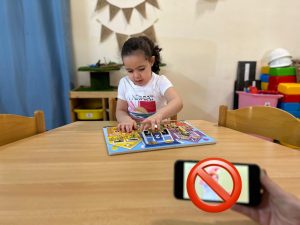In this Digital Era we are living with screens everywhere, whether it is a smartphone, tablet, television, or computer screen. Children are spending more time in front of the screens.
When there is a proper kids screen time chart, it can help children to have a healthy balance between the digital world and real-life experiences.
Here’s how screen time affects different aspects of a child’s development, and what parents can do to manage it effectively.
1. Social Development
Excessive screen time can lead to fewer face-to-face interactions with peers and family, which are essential for developing strong social skills.
When children spend too much time in front of screens, they may struggle to recognize social cues like body language, tone of voice, and facial expressions.
This lack of real-life socialization can result in difficulties making friends and miscommunication.
Screen Time Management Strategy: Parents can promote social interaction by enrolling in an early childhood center, scheduling playdates, engaging in family activities, and involving children in group settings such as sports clubs.
Designating specific times for screen use, like after school, can help maintain a balance between digital and in-person interactions.
2. Emotional Development
Children who spend excessive time on screens may experience emotional issues such as anxiety, irritability, and mood swings.
Instant gratification from apps and games can diminish a child’s ability to self-regulate emotions, making it more challenging to cope with frustration, boredom, or delayed rewards.
Screen Time Management Strategy: To support healthy emotional development, parents should limit screen time and monitor the content their children consume.
Establishing tech-free zones or times, such as during meals or before bedtime, can create opportunities for emotional regulation and reflection.
Encouraging mindfulness practices and outdoor play can also help children learn to manage their emotions more effectively.
3. Sensory Development
Children need to engage their senses through real-world activities, such as playing outside, touching objects, and moving their bodies.
Prolonged screen time can lead to sensory deprivation, and excessive focus on screens may result in issues like eye strain, sleep disturbances, and sedentary behavior, which can further limit sensory and physical growth.
Screen Time Management Strategy: Parents can encourage outdoor play and activities that stimulate children’s senses, such as playing with sensory toys and engaging in physical activities.
Ensuring that children take regular breaks from screens to move around and explore their environment is crucial.
4. Academic Development
While educational apps and programs can be beneficial, excessive screen time can lead to a decline in academic performance.
Spending too much time on entertainment-focused screens can reduce the time children allocate for homework, reading, and creative play, all of which are critical for academic success.
Multitasking between screens and schoolwork can impair concentration and diminish the quality of learning.
Screen Time Management Strategy: Parents can promote academic development by ensuring that screen time is purposeful and balanced with non-digital educational activities.
Setting time limits for recreational screen use during school nights and designating time for homework, reading, and offline learning can help.
How to Manage Screen Time for Kids?
- Enroll in a Nursery: When children join nurseries from an early age they develop crucial social and emotional skills that continuously benefit them as they grow older. Parents should consider sending their children to Screen-free nurseries like Super Kids, which focus on developing children holistically.
- Set Clear Limits: Establish daily screen time limits based on your child’s age. The American Academy of Pediatrics recommends no more than one hour of high-quality screen time per day for children aged 2-5 and consistent limits for older kids.
- Encourage Tech-Free Zones: Designate specific areas or times as tech-free zones. For example, keep screens out of bedrooms and off the dinner table to promote conversation and family bonding.
- Be a Role Model: Children often mirror their parents’ behavior, so it’s important to model good screen habits. Limit your own screen use during family time and prioritize offline activities.
- Monitor Content: Keep track of what your child is watching, playing, or interacting with. Encourage the use of educational apps and programs while avoiding content that may be inappropriate or harmful to their development.
- Balance Screen Time with Physical Activity: Ensure your child has ample opportunities for physical play and outdoor activities. Set aside time each day for them to engage in sports, outdoor games, or other active hobbies.
- Use Screens Together: Watching or playing together allows parents to discuss what their children are seeing and learning, providing opportunities for shared experiences and valuable conversations
Conclusion
Managing screen time is vital for supporting a child’s overall development, from social interactions to emotional well-being and academic performance.
It is essential to set boundaries and encourage more outdoor activities, fostering healthy screen habits. Parents can help their children thrive in both the digital and real worlds.
When balanced thoughtfully, screen time can become a valuable tool for learning, entertainment, and connection without compromising their growth.







